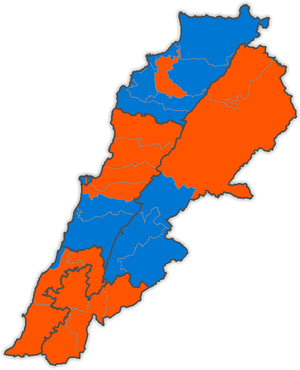|
2009 Lebanese general election
Parliamentary elections were held in Lebanon on 7 June 2009[1][2] to elect all 128 members of the Parliament of Lebanon. Although general elections are held every four years, this parliament due to various reasons stayed in power until the 2018 general election. Background
The 2009 election was the first general election in Lebanon to be done in one day. Usually, the election used to be divided into four rounds across four weeks, with each round being held in different regions across Lebanon. Before the election, the voting age was to be lowered from 21 to 18 years, but as this requires a constitutional amendment, it did not happen before the election.[3] Allocation of seatsFollowing a compromise reached in the Doha Agreement in May 2008 between the government and opposition, a new electoral law was put in place, as shown in the table below.[4] It was passed on 29 September 2008.[5]
Results Preliminary results indicated that the turnout had been as high as 55%.[7] The March 14 Alliance garnered 71 seats in the 128-member parliament, while the March 8 Alliance won 57 seats. This result is virtually the same as the result from the election in 2005. However, the March 14 alliance saw this as a moral victory over Hezbollah, who led the March 8 Alliance, and the balance of power was expected to shift in its favor.[8] Many observers expect to see the emergence of a National Unity Government similar to that created following the Doha Agreement in 2008.[9]
Formation of governmentAs is typical of Lebanese politics political wrangling after the elections took 5 months.[11] Only in November was the composition of the new cabinet agreed upon: 15 seats for the March 14 Alliance, 10 for the March 8 Alliance, and 5 nominated by Lebanese President Michel Suleiman, who has cast himself as a neutral party between the two main political blocks.[12] AftermathThe government fell in January 2011 after the March 8 alliance's 11 ministers withdrew from the government over PM Hariri's refusal to convene a cabinet meeting to discuss possible indictments to be issued by the Special Tribunal for Lebanon.[13] The March 8 alliance formed a new government in the ensuing six months, at which point the seats in parliament were divided as follows.
References
External links
|
|||||||||||||||||||||||||||||||||||||||||||||||||||||||||||||||||||||||||||||||||||||||||||||||||||||||||||||||||||||||||||||||||||||||||||||||||||||||||||||||||||||||||||||||||||||||||||||||||||||||||||||||||||||||||||||||||||||||||||||||||||||||||||||||||||||||||||||||||||||||||||||||||||||||||||||||||||||||||||||||||||||||||||||||||||||||||||||||||||||||||||||||||||||||||||||||||||||||||||||||||||||||||||||||||||||||||||||||||||||||||||||||||||||||||||||||||||||||||||||||||||||||||||||||||||||||||||||||||||||||||||||||||||||||||||||||||||||||||||||||||||||||||||||||||||||||||||||||||||||||||||||||||||||||||||||||||||||||||||||||||||||||||||||||||||||||||||||||||||||||||||||||||||||||||||||||||||||||||||||||||||||||||||||||||||||||||||||||||||||||||||||||||||||||||||||||||||||||













